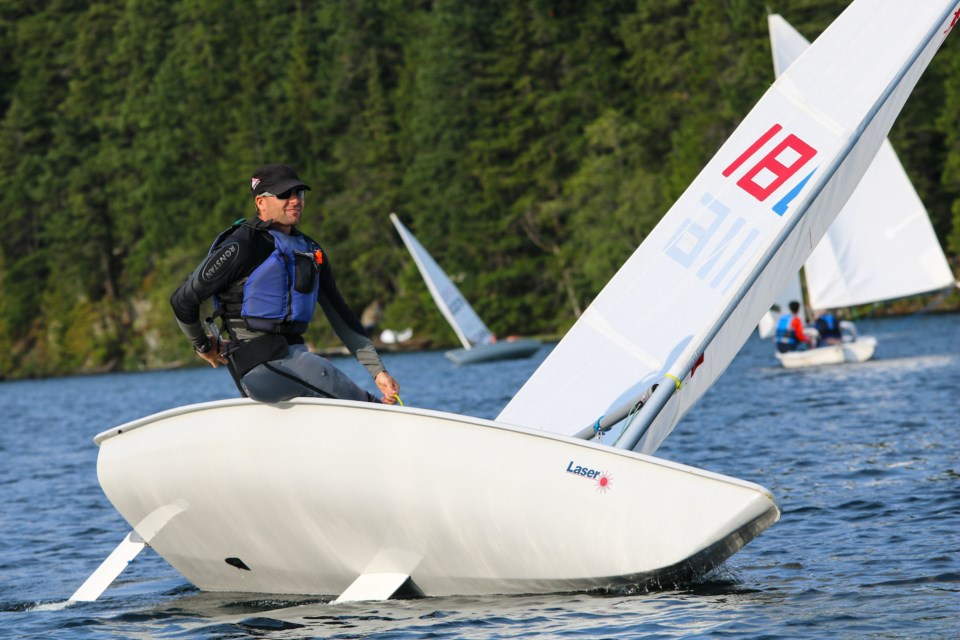It’s been a life well spent on the water for Francois Hebert.
The Montreal native grew up cruising around Lake Ontario aboard his family’s sailboat, which naturally piqued his interest in learning the sport personally. He began racing as a preteen and made his way up to a five-year stint with Quebec’s provincial team—although he was never quite able to make the leap to the national squad. Then he moved to Whistler.
In his early 20s at the time, Hebert became a ski instructor but remained faithful to his first love of sailing. It’s a good thing he did, for late last year he became the first Canadian in more than 20 years to win the ILCA7 Laser Master Sailboat Championship Races.
“It was a really fun way to finish the sailing season,” said Hebert. “I hadn’t raced too much in a Laser [boat], so it was really great to see that I’m quite competitive in the field. It opens the door to a new type of racing.”
Laser-focused
Invented in 1970 by Canadians Ian Bruce and Bruce Kirby, Laser dinghies prioritize simplicity and performance in their design. As the largest sailboat class on Earth, more than 225,000 units have been built and are utilized in 140 nations. Typical Olympic events feature more than 50 boats each, one for each different country.
Many have tested themselves in the Laser division at all levels, so it remains highly competitive even for older Masters athletes.
Hebert pulled up to Alameda, Calif. in mid-October alongside fellow sailors from all continents. Their mission was to expediently navigate San Francisco Bay, with its variable winds and powerful currents. The 40-year-old readied his game plan by arriving a few days early to scope out the waters and gather intel from knowledgeable locals.
The Bay Area’s mercurial, shifting winds actually resemble those found on some of Whistler’s lakes to an extent, which is part of the reason why Hebert prevailed over runner-up Tony Martin and Julian Soto in third.
“You can sail your whole life and still learn something new, or sail in a condition that you haven't encountered before,” said Hebert. “If I can describe sailboat racing, it's a bit like playing chess on the water. There's a lot of tactics and strategy involved. As you get older, you're maybe a little bit less fit but you can still be pretty smart. Experience helps to make better decisions on the water.”
Maritime leadership
Hebert remains competitively active, placing fifth in Canada’s own 2022 Laser Masters Championship. The win from Alameda marks his inaugural international breakthrough. He’s satisfied with his performance, but accolades are not the be-all and end-all of why he sails.
Since 2011, Hebert has served as general manager of the Whistler Sailing Association (WSA). His team now includes 15 instructors and 45 boats, along with eight coach boats equipped with outboard motors. Over 1700 student days are logged every summer in addition to the club’s regularly scheduled Wednesday regattas.
There are few things that Hebert finds more fulfilling than his work helping young sailors acquire skills, certifications and a love of their sport. James Cannon, for instance, participated in WSA programs and volunteer opportunities for almost a decade before becoming their race coach.
“The Whistler sailing community is really grassroots,” Hebert explained. “There's so much support for all the different sports in town and people really get into it. Definitely the most rewarding part of my job is seeing these young individuals come through our organization.
“There's certain leadership skills you need in the sailing environment because the water always changes, and you always have to make decisions to stay safe. When I think of [James and many other club members], they have competencies that will serve them well in whatever they choose to do later in life.”
Sailing season officially commences on May 22 and extends through September 7. The WSA is currently aiming to raise $10,000 for a new outdoor classroom, where instructors can brief pupils on all-important theoretical knowledge before getting to the boats. Hebert encourages anyone remotely interested to check out WSA programs or enroll their kids in a camp, for Alta Lake’s warm water and reliable winds present an excellent training ground.
More information about the WSA can be found at https://www.whistlersailing.com/.




